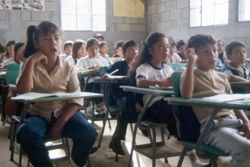Difference between revisions of "Education/Intro"
| Line 1: | Line 1: | ||
| − | [[Image:School.jpg|250px|right|Will it look like this in the future? Probably not]] Ignorance is a source or contributing factor in many of the problems we face today, such as AIDS, pollution and food production. Quality '''education''' is hugely important in providing the bright minds that will drive the progress of our civilisation. | + | [[Image:School.jpg|250px|right|thumb|Will it look like this in the future? Probably not]] Ignorance is a source or contributing factor in many of the problems we face today, such as AIDS, pollution and food production. Quality '''education''' is hugely important in providing the bright minds that will drive the progress of our civilisation. A first-rate education for the citizenry {{wp|Synergy|synergizes}} with every other element of an advanced civilization: scientific discovery happens faster, open collaborative projects grow faster and at a better quality, public health improves, solutions to our problems come faster and ambitious projects like [[Colonising Space|colonising space]] or curing cancer become more and more feasible. |
How can we promote better education? The answer seems simple: make learning truly interesting, more relevant to the individual and make proper use of modern media. An inflexible curriculum only benefits the schools and assessment bodies. | How can we promote better education? The answer seems simple: make learning truly interesting, more relevant to the individual and make proper use of modern media. An inflexible curriculum only benefits the schools and assessment bodies. | ||
Revision as of 20:48, 27 April 2010
Ignorance is a source or contributing factor in many of the problems we face today, such as AIDS, pollution and food production. Quality education is hugely important in providing the bright minds that will drive the progress of our civilisation. A first-rate education for the citizenry synergizes with every other element of an advanced civilization: scientific discovery happens faster, open collaborative projects grow faster and at a better quality, public health improves, solutions to our problems come faster and ambitious projects like colonising space or curing cancer become more and more feasible.
with every other element of an advanced civilization: scientific discovery happens faster, open collaborative projects grow faster and at a better quality, public health improves, solutions to our problems come faster and ambitious projects like colonising space or curing cancer become more and more feasible.
How can we promote better education? The answer seems simple: make learning truly interesting, more relevant to the individual and make proper use of modern media. An inflexible curriculum only benefits the schools and assessment bodies.
Interactive educational media could be engaging and effective, but there is remarkably little high quality material available. It usually focuses too much on entertainment without sufficient educational content, or it is badly produced and not particularly compelling. Luckily it is becoming ever easier to create interactive 3D computer generated environments such as those found in advanced computer games, and with the right scripting engine for the interaction and behaviour, making a captivating experience where the child (or adult) hardly realises they are learning.
It is a crime for education not to be interesting! Luckily, for every module of every subject there are educators (and others) who are truly gifted at explaining and teaching key concepts and we must make better use of these people in conjunction with the latest technology to help disseminate knowledge to those who wish to learn, wherever they might be in the world.
